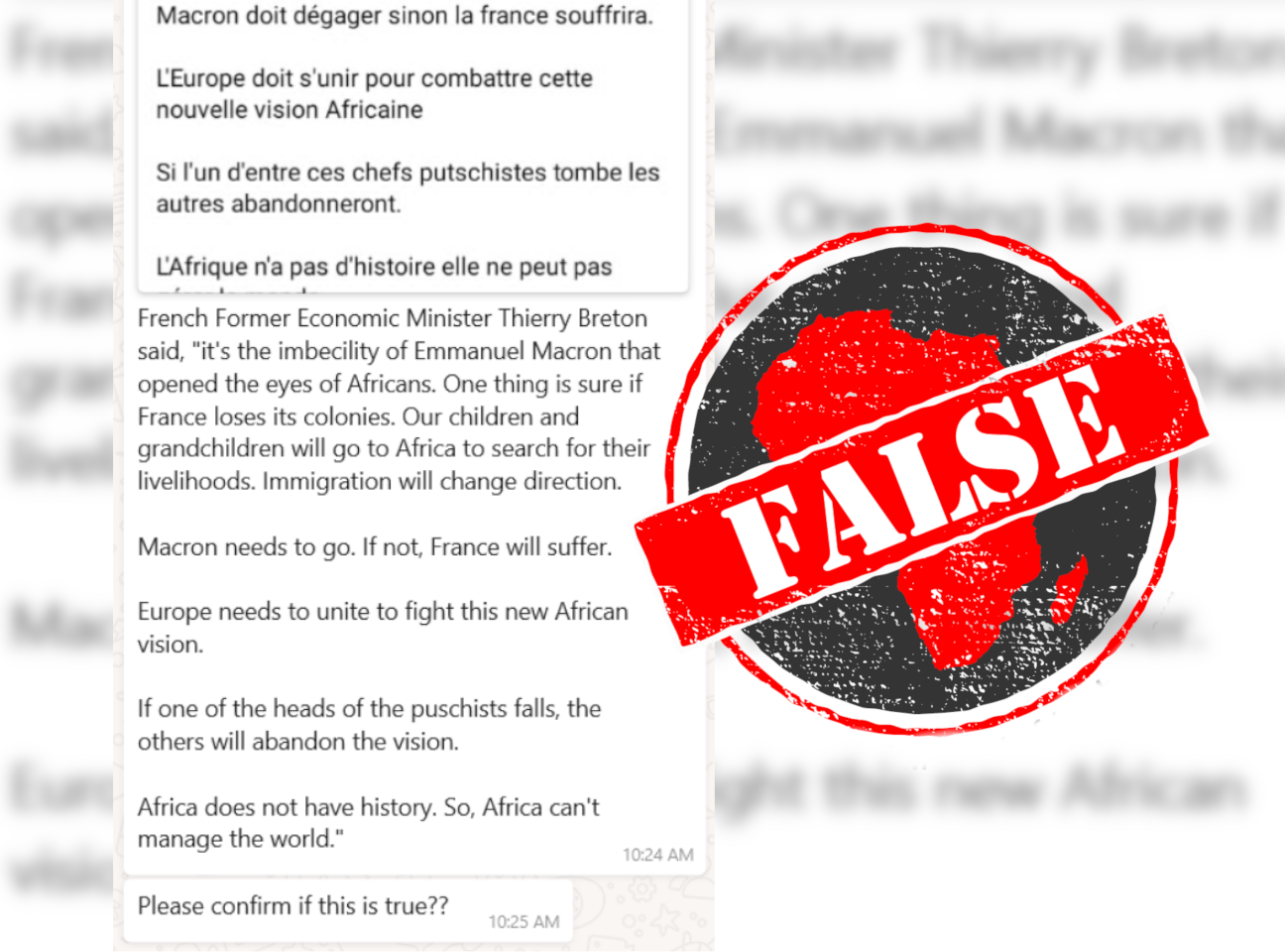IN SHORT: Quotes attributed to European Union commissioner Thierry Breton criticising the “imbecility” of French president Emmanuel Macron over his policy approach to Africa are false. There is no evidence that Breton ever said these things.
A message circulating on social media claims that Thierry Breton has criticised the “imbecility” of French president Emmanuel Macron. Brenton is the French commissioner to the European Union (EU), where he serves as commissioner for the internal market.
The EU comprises 27 member states and is dedicated to the management of common economic, social and security policies.
The message, written in French and English, was also published in an article on the notoriously unreliable Zambian Observer website. A version of the message was also sent to Africa Check via WhatsApp.
The posts claim Breton said: “It's the imbecility of Emmanuel Macron that opened the eyes of Africans. One thing is sure if France loses its colonies. Our children and grandchildren will go to Africa to search for their livelihoods. Immigration will change direction. Macron needs to go if not France will suffer.”
Breton also supposedly said: “Africa does not have history. So, Africa can't manage the world.”
But did Brenton make these comments? We took a closer look.

Claims unsubstantiated, no reports of Breton saying this
The message immediately raises several red flags that it may be false. It provides no context for where or when Breton supposedly made the statement. Typically, the images of Breton shared alongside the message are an AFP stock photo from 2014 or one from the European Parliament, which is used on his Wikipedia page. The message also doesn't cite a source for its claims.
Searches for the claim return no proof that Breton ever said such a thing. The earliest example of the claim found by Africa Check was a French Facebook post that made the claim without evidence. The message was posted by the Malian Facebook page Nabi Malien Den Halala, which has been found to have created and posted false claims in the past.
The few websites that have written about Breton’s supposed comments are not reliable news sources and appear to have copied the claims from social media. The Zambian Observer article, for example, simply repeats the message posted on social media, along with a screenshot of a French Facebook post.
Africa Check alone has debunked claims made by the Zambian Observer several times in the past. While not everything published on the site is false, it is typically unverified, and the site has been identified as a source of false claims in the past.
Reliable sources such as the French Le Monde and France 24 or the international Reuters and BBC News have not published anything supporting these claims.
Breton has not been publicly critical of Macron’s policies in Africa
The false message plays on a particularly contentious issue that Macron has apparently been trying to address in recent years: France's colonial history in Africa.
Since becoming president in 2017, Macron has made several attempts to strengthen diplomatic ties with Africa. He has made several diplomatic visits to African countries, called France’s colonial history in Africa “a crime against humanity” and promised to redress “Francafrique” – a term for the post-colonial influence France has held in former colonies.
Macron’s approach has been criticised as insufficient, misguided, and having failed to win sympathy in former colonies. However, Africa Check found no evidence that Breton (who was proposed by Macron for his EU commissioner position) has criticised this approach for any reason.
Since he was appointed as EU commissioner, Breton has largely focused on regulating technologies such as social media and artificial intelligence. His public comments on Africa have tended to focus on strengthening diplomatic relations between African and EU countries.
Republish our content for free
For publishers: what to do if your post is rated false
A fact-checker has rated your Facebook or Instagram post as “false”, “altered”, “partly false” or “missing context”. This could have serious consequences. What do you do?
Click on our guide for the steps you should follow.
Publishers guideAfrica Check teams up with Facebook
Africa Check is a partner in Meta's third-party fact-checking programme to help stop the spread of false information on social media.
The content we rate as “false” will be downgraded on Facebook and Instagram. This means fewer people will see it.
You can also help identify false information on Facebook. This guide explains how.


Add new comment